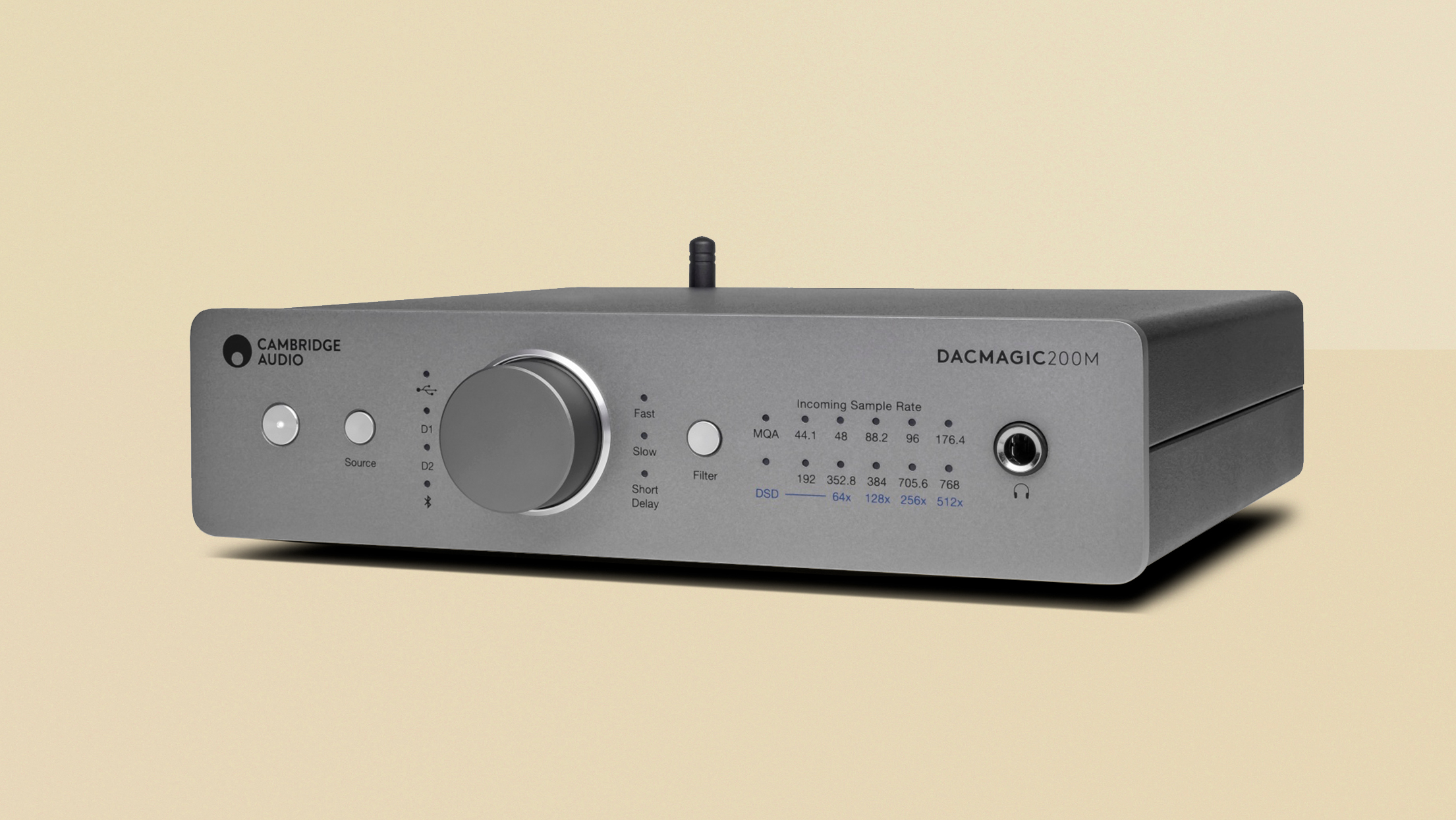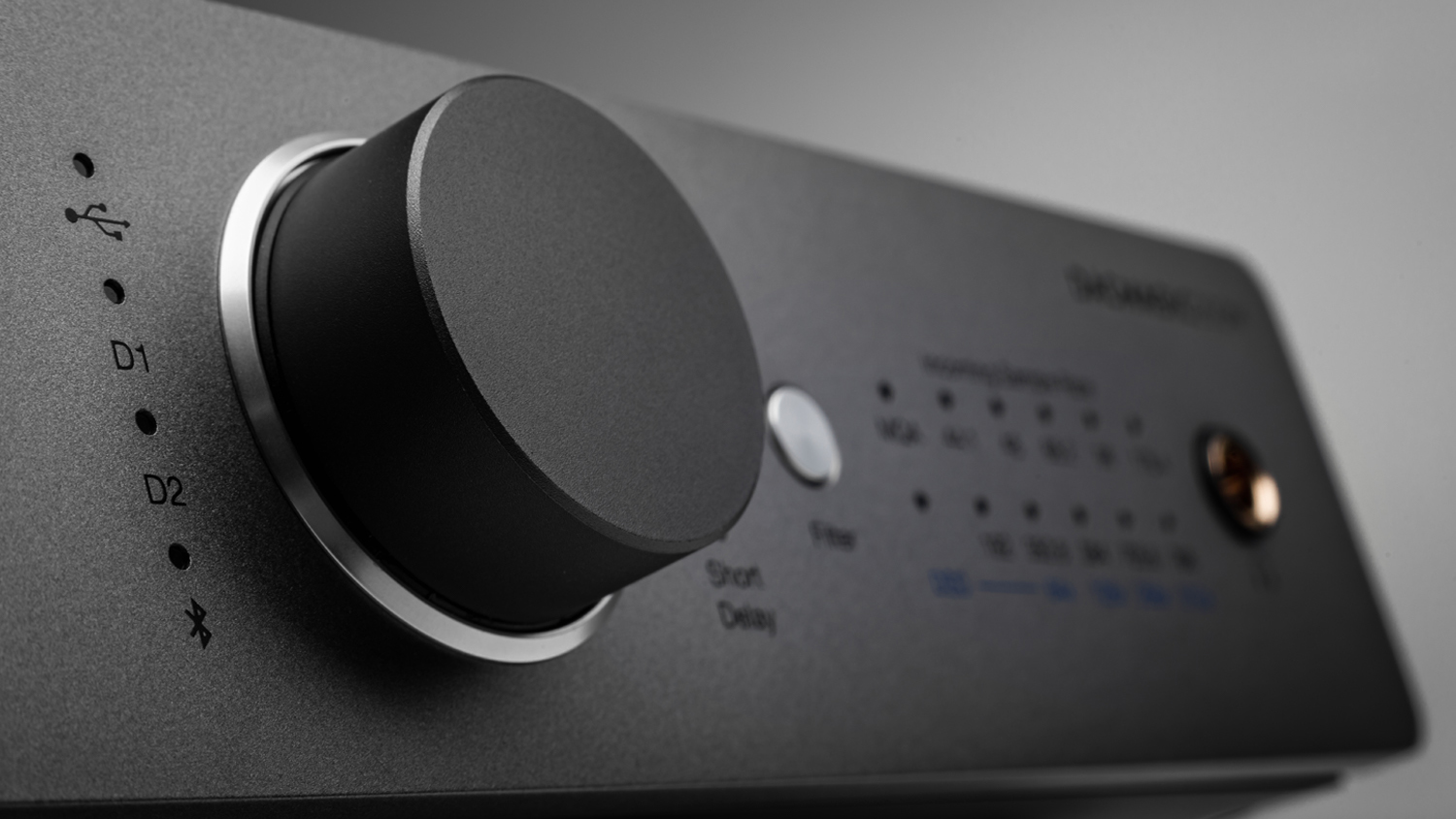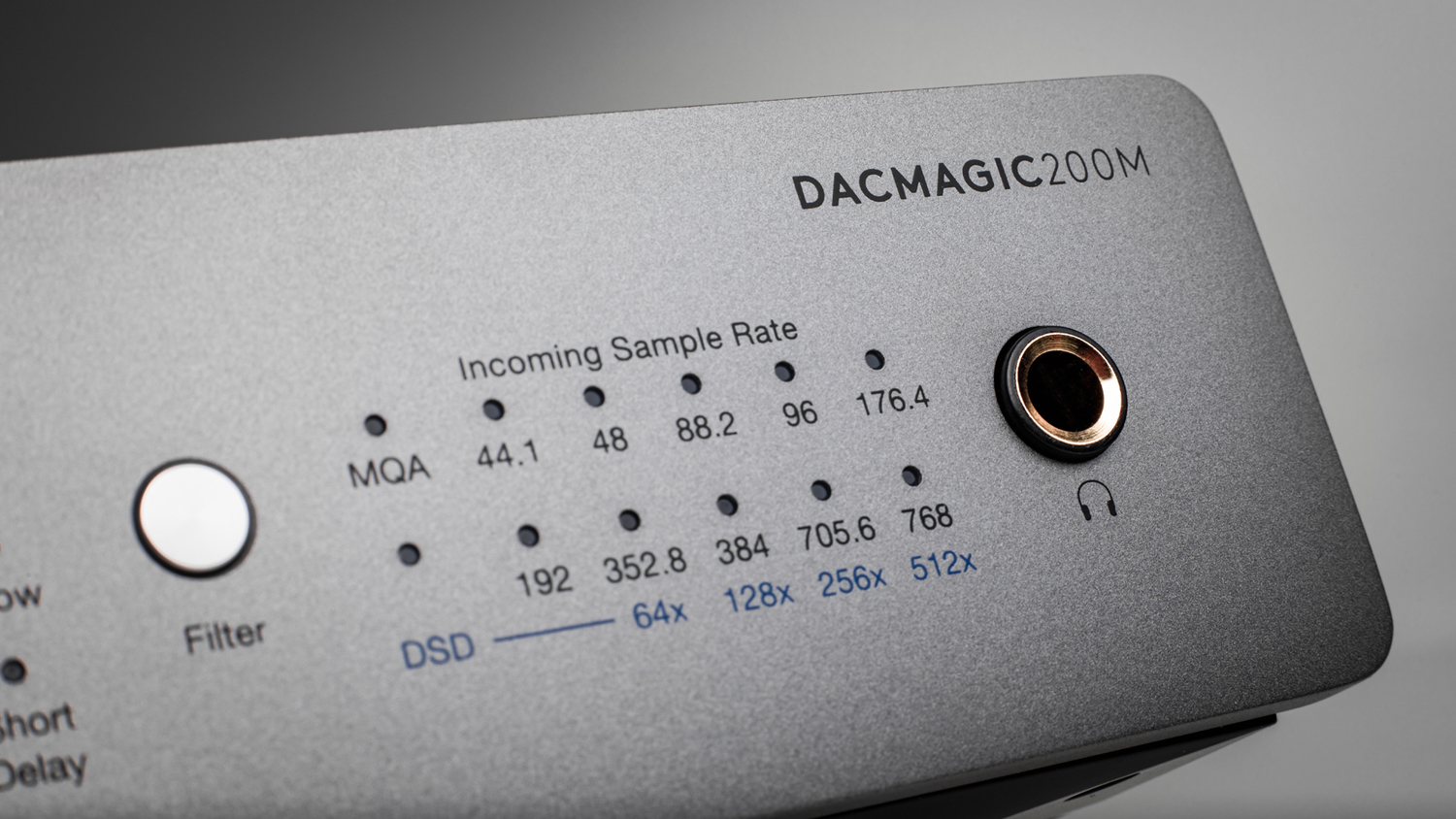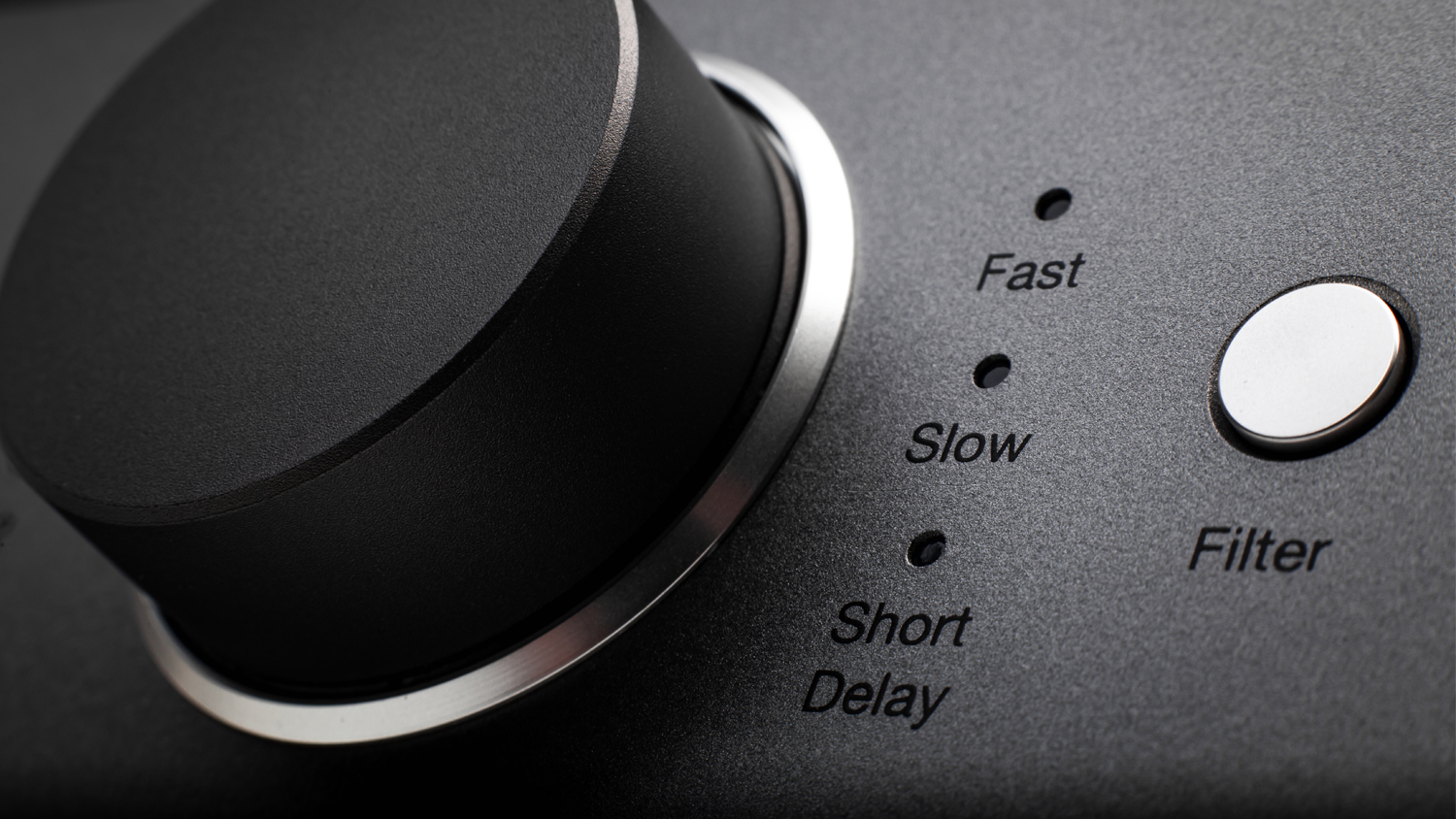Cambridge Audio DACMagic 200M review: a fantastic DAC and headphone amp
The Cambridge Audio DACMagic 200M brings elite sound to your laptop or your hi-fi system


If the DACMagic 200M can’t improve your digital audio performance, you must have quite the setup already. It's overflowing with features, and the sound quality is simply wonderful.
-
+
Detailed, open and considered sound
-
+
Great specification
-
+
Equally at home in a full system or on a desktop
-
-
Wireless sound is relatively ordinary
-
-
No remote or control app
Why you can trust T3

This Cambridge Audio DACMagic 200M review takes a look at an incredibly well-specified headphone amplifier and digital-to-analogue converter. It’s designed as a standalone alternative to the DAC fitted to the majority of digital hardware (laptops, CD players, streamers, games consoles and so on) and vows to make a better fist of the crucial D-to-A processing than those machines can manage. And as a functionality bonus, it wants to do the same for your headphones: take the job of amplifying them away from your existing equipment and do it better.
Of course, this type of product is hardly a novelty – it’s a whole category of its own. The best DACs range from cheap USB DACs, designed to bring the best from your laptop or smartphone, to full-on audiophile kit-rack alternatives costing many thousands, you’re spoiled for choice.
With the DACMagic 200M, Cambridge Audio seeks to occupy the centre ground, in terms of price and physical dimensions at the very least. This is a tidily compact device, yet finds room to include compatibility with each and every worthwhile digital audio format along with a stack of physical and wireless connections.
And it doesn't forget to make the audio quality just as strong as the specs. This is an improvement for just about any setup where you've got good-quality audio components, such as the best wired headphones, and is massively future-proof.
Cambridge Audio DACMagic 200M review: price & release date
The Cambridge Audio DACMagic 200M is on sale now, and in the United Kingdom it's yours for around £449. In the United States, you’re looking at something like $499. Long-suffering Australian consumers, meanwhile, will have to fork out a giddy AU$899 to take possession of a DACMagic 200M.
As already observed, there’s a fair bit of choice where products like this are concerned, and the Cambridge Audio’s price brings it into more-or-less direct competition with some extremely well-regarded alternatives.
Chord’s Mojo, for example, is more restricted in pure functionality terms but has long been admired for the quality of its performance. And despite the painfully unfunny brand name, Schiit’s tube-driven Lyr3 is a fine-sounding alternative for not a great deal more money.
Get all the latest news, reviews, deals and buying guides on gorgeous tech, home and active products from the T3 experts
So the DACMagic 200M is right in line with the competition for quality, and might have the edge on features.

Cambridge Audio DACMagic 200M review: features
No two ways about it, the DACMagic 200M is specified to get the job done. It may be a trifling 215x52x191mm but it’s packed with functionality.
On the inside, business is taken care of by a pair of ESS Sabre ES9028Q2M digital-to-analogue converter chips. These make the 200M compatible with PCM digital audio files up to 32but/784kHz standard, as well as DSD512. With MQA compatibility on board too, there isn’t a digital audio file worthy of the name that the Cambridge Audio can’t handle.
Connectivity is about as thorough as compatibility, too. On the rear panel there are a couple of digital optical Toslink inputs, and a pair of digital SP-DIF coaxial inputs using RCA sockets – all four are capable up to the 24bit standard.
There’s also a USB input that’s good up to 32bit – although it’s of the less common USB-B type. That's fine in terms of connecting to a laptop or other USB-ouputting source, but it's 2021 – we'd like to see an easy USB-C option too.
Wireless connectivity is via Bluetooth 4.2 with support for SBC, AAC and aptX codecs – there’s a tidy screw-in aerial helping with Bluetooth business. Outputs on the back run to a pair of balanced XLR sockets and an unbalanced pair of RCA outputs.
The front panel (a nice slice of machined aluminium) features a power button, source selector, decently weighted volume control and a 12-strong collection of little tell-tale lights indicating the details of the incoming digital audio file. There’s also a filter control (‘fast’, ‘slow’ and ‘short delay’) and a 6.3mm headphone socket.

Cambridge Audio DACMagic 200M review: performance
It’s not only flexible where connectivity and what-have-you is concerned – the Cambridge Audio DACMagic 200M is also physically versatile. It’s portable enough to form part of a desktop system (it needs power from a socket, though, don’t forget) just as easily as it can slot into your main system. So naturally that’s how we listen to it.
In some ways it’s most impressive as a desktop device, if for no other reason than it’s a colossal improvement on the sound of an unassisted MacBook Pro. Connected via USB-B and playing content (of various genres and file types) from the TIDAL desktop app, the gains in detail, heft, integration, focus, soundstage definition and plenty more besides, are obvious and significant via the Class A/B-powered headphone output.
Use appropriately talented headphones and the 200M is a deeply rewarding little device. Low frequencies gain weight and authority, as well as a stack more information regarding texture and timbre. The top of the frequency range is better defined, with an expertly judged level of bite and attack accompanying the increases in substance and fine detail. Voices in the midrange sound more immediate, more convincing and, again, more detailed. The overall presentation is smooth, organised and has far more rhythmic certainty than the laptop can manage on its own.
Introduce the 200M into a more expansive system, and a lot depends on the quality of integrated DAC you’re replacing and the ability of the overall system, of course. An accomplished (and almost certainly pricey) CD player, for example, may show relatively gentle gains in performance. But when you route a TV or set-top box, a games console or a Blu-ray player through the Cambridge Audio, all of the positivity of performance we noted in its desktop performance comes through loud and clear. The improvements in rhythmic expression and fine detail retrieval, in particular, can be genuinely startling.
As far as Bluetooth goes, the 200M is an altogether more qualified success – quite a bit of the alacrity, unity and positivity of its performance drops away a little. Everything’s relative though, of course, and the Cambridge Audio remains an engaging and enjoyable listen. And as a way of bringing some wireless connectivity to a system that has none, it could be a lot worse.
Cambridge Audio DACMagic 200M review: design & usability
As far as usability is concerned, it really couldn’t be any more straightforward. There’s no control app, no remote control… so just make your digital connection, hook the 200M to your amplifier or plug in your headphones, and that’s all there is to it. You’ll need to set a volume level, of course, and investigate your trio of filter options – but fundamentally the Cambridge Audio is a very straightforward device.
In fact, ‘straightforward’ could just as easily be applied to the way the 200M is designed. It’s clean-looking, anonymous in the best way – it doesn't draw attention to itself but, should you have a proper touch and feel, it just about manages to appear the money’s-worth. The aluminium front-plate is quite luxurious and, um, that’s about it.

Cambridge Audio DACMagic 200M review: verdict
Sturdy, compact, lavishly specified and with performance to match, the Cambridge Audio DACMagic 200M is nigh-on perfect. If you like an informed, rapid and smoothly aggressive sound, you’ll find your boat well and truly floated.
Cambridge Audio DACMagic 200M review: also consider
The Chord Mojo is marginally, but undeniably, an even more accomplished DAC/headphone amp than the DACMagic 200M for sound – it’s an even more deft and revealing listen. But it’s battery powered, has just a pair of 3.5mm outputs and lacks some of the Cambridge Audio’s format functionality (particularly MQA compatibility). If you just need something to go from a laptop or phone to headphones, it's maybe the better choice. But if you want versatility and future-proofing, the DACMagic 200M is better for that.
Simon Lucas is a freelance technology journalist and consultant, with particular emphasis on the audio/video aspects of home entertainment. Before embracing the carefree life of the freelancer, he was editor of What Hi-Fi? magazine and website – since then, he's written for titles such as Wired, Metro, the Guardian and Stuff, among many others. Should he find himself with a spare moment, Simon likes nothing more than publishing and then quickly deleting tweets about the state of the nation (in general), the state of Aston Villa (in particular) and the state of his partner's cat.
